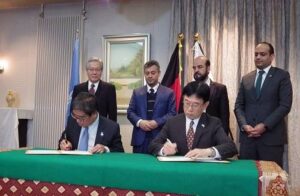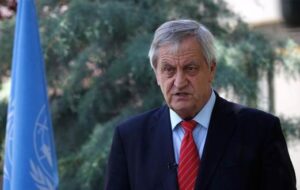KABUL (SW): The Senior Officials’ Meeting (SOM) entered second day on Saturday at the Presidential Palace as the Kabul government and its international backers discuss ways to improve governance, security and the state of human rights in Afghanistan.
The Second Senior Officials Meeting (SOM) is a continuation of the high level meetings held every year to follow up on the new phase of partnership initiated at the Tokyo Conference (July 2012), based on principles of mutuality and accountability, through the Tokyo Mutual Accountability Framework (TMAF). The purpose of the Meeting is to review progress since the presentation of the Realizing Self-Reliance reform program, discuss key policy issues, and to jointly decide the way forward.
At the inaugural session Friday evening, President Mohammad Ashraf Ghani said that the agenda laid out by the National Unity Government at the London Conference was not only a credential, but a charter explaining plans for the reconstruction of the country. Referring to the peace talks, Ghani said this process would continue to save loss of innocent lives.
Expressing confidence about the state of economy, Ghani said the government would soon come-up with a comprehensive budget that would not only reflect will for improvement but would also highlight surge in revenue collection.
According to the Ministry of Finance (MoF) the relationship between the government and its international backers will continue to be governed by the following principles:
1. The international community will support the developmental priorities identified by the government;
2. The government’s delivery of the mutually agreed commitments will be the key for sustained international support;
3. Predictable aid is critical to effective government delivery;
4. Lessons from aid effectiveness should be acted upon by the international community and the government;
5. Building a system of governance is crucial to the elimination of corruption and ensuring transparency, efficiency and effectiveness;
6. International assistance aligned with a limited number of outcome-focused National Priority Programs is essential for the sustainability of development assistance and citizen buy-in and loyalty;
7. International assistance should be provided through the national budget to ensure alignment of short, medium and long-term goals;
8. Transparent, citizen-based, monitoring of development and governance benchmarks provides accountability to the Afghan people, and reinforces the reciprocal commitments of donors and the government to improved development performance;
9. Building market institutions is critical to attracting, both domestic and foreign, investment and thereby creating sustainable economic growth and jobs; and
10. Regional economic cooperation is the key to ensuring growth, eliminating poverty and utilizing the immense trade and transit potential of Afghanistan and its neighbors.
ENDS





